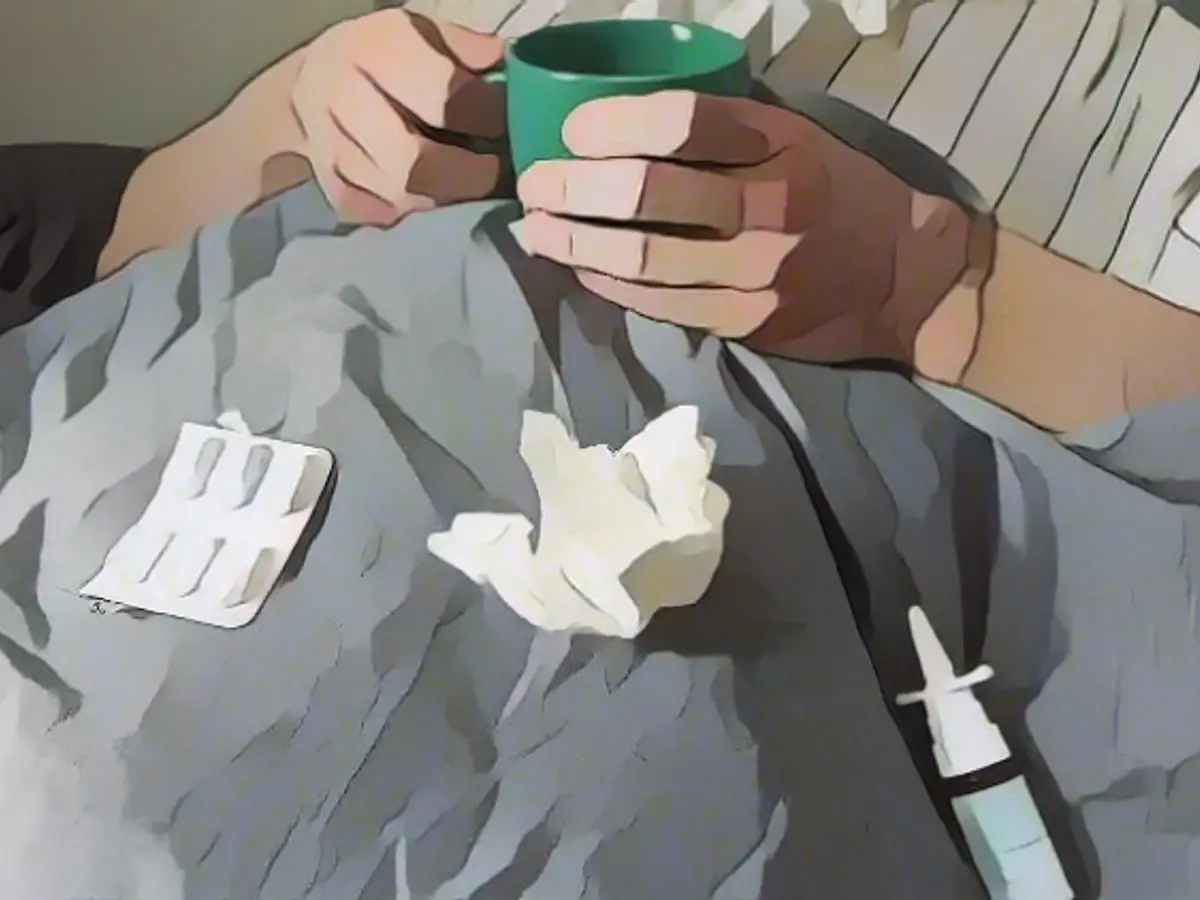Holiday Sniffling: Rising Respiratory Infections in Germany
Just when you thought the holiday season couldn't get any more chaotic, Germany is grappling with an unfortunate increase in acute respiratory infections. The Robert Koch Institute (RKI), Germany's national health authority, reports a significant surge in infections, with Coronaviruses, colds, and flu still on the rise[1].
But there's more to the story. This year, Respiratory Syncytial Virus (RSV) and influenza have joined the fray, adding another layer of concern to the healthcare system. The RKI's latest report estimates over 7.9 million cases of acute respiratory illnesses, marking a sharp increase from the previous 7.1 million[2].
The (Not So) Silent Influence of Corona
While Coronaviruses still reign supreme, influenza hasn't gone unnoticed. The flu wave, triggered by influenza viruses, has yet to officially begin. However, influenza cases have been increasingly affecting school-age children and young adults, with laboratory-confirmed cases doubling week over week[2].
Meanwhile, SARS-CoV-2 remains a dominant player, with just under 27,000 cases reported for the recent week. It's important to remember that these figures only represent the tip of the iceberg, as infections often go undetected[2].
One More Pathogen to Contend With
With Coronaviruses now making up a significant proportion of all respiratory infections, experts like Carsten Watzl, an immunologist from Dortmund, aren't surprised[3]. "We now have one more pathogen for respiratory diseases," he explains[3].
Watzl is adamant that fears about the COVID-19 pandemic weakening our immune systems are unfounded[3]. "Contrary to popular belief, there's no need to 'train' our immune systems through infections," he adds.
Finding Balance in Warning and Prevention
Politicians and health experts like Karl Lauterbach have cautioned against letting down our guard, advocating for continued vaccinations and vigilance[1]. Their stance, however, has drawn criticism from health insurance physicians like Andreas Gassen.
"The urgency of his warnings and appeals are excessive," Gassen told the Rheinische Post newspaper[1]. Gassen argues that the current situation is no different from what we've experienced with seasonal flu or colds in the past[1].
Looking Ahead
While the rise in acute respiratory infections poses a significant challenge for Germany's healthcare system, experts like Watzl remain hopeful. "Once we've had our encounter with these pathogens, our immune systems will be ready for whatever comes next," he explains[3].
Enrichment Data
As of the latest available data, the current trends in acute respiratory infections in Germany include:
- Influenza Activity:
- High and Intense Activity: Influenza activity remains high and intense in the EU/EEA, with co-circulating A(H1)pdm09, A(H3), and B/Vic viruses. The activity is driven by different patterns of dominance across countries, with some countries still experiencing increasing trends while others have reached or passed peak activity[1].
- RSV Activity:
- Elevated Activity: Respiratory Syncytial Virus (RSV) activity is elevated, with a slowly decreasing trend. Hospital admissions due to RSV remain particularly elevated in children under five years old[1].
- SARS-CoV-2 Activity:
- Low Activity: SARS-CoV-2 activity is at a very low level, indicating a significant reduction in COVID-19 cases compared to previous waves[1].
Health Officials' and Politicians' Stance on Precautions and Vaccinations
- Public Health Recommendations:
- Vaccination: Health officials emphasize the importance of vaccination against influenza, COVID-19, and RSV, particularly for those at higher risk of severe outcomes and healthcare workers. Vaccination is encouraged to limit severe disease outcomes[1].
- Infection Prevention and Control: Countries are advised to prepare for continued strain on healthcare systems and consider infection prevention and control practices in healthcare settings[1].
- National Response:
- Germany’s National Pandemic Plan: Germany has a common National Pandemic Plan that outlines the responsibilities and measures of the healthcare system actors in case of a pandemic. The plan includes three stages: containment, protection, and mitigation, with a focus on reducing morbidity and mortality, ensuring treatment of infected persons, and maintaining essential public services[2].
- Specific Measures:
- Mandatory Masks: In some regions, like Bavaria, the wearing of FFP2 masks has been made mandatory on public transport and in supermarkets, with provisions for free masks for low-income groups and social welfare recipients[2].
- Booster Campaigns: Germany has launched booster vaccination campaigns to combat the Omicron variant, with a focus on central government strategy[2].
[1] [2] Robert Koch Institute [3] Carsten Watzl, Immunologist, Dortmund Gestaltungsuniversitaet








